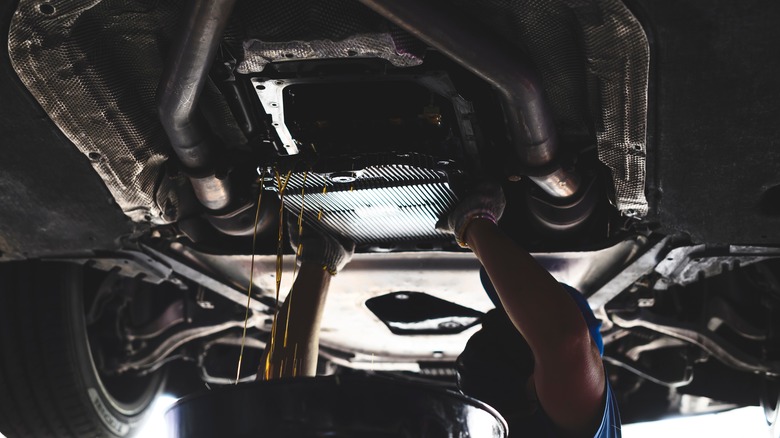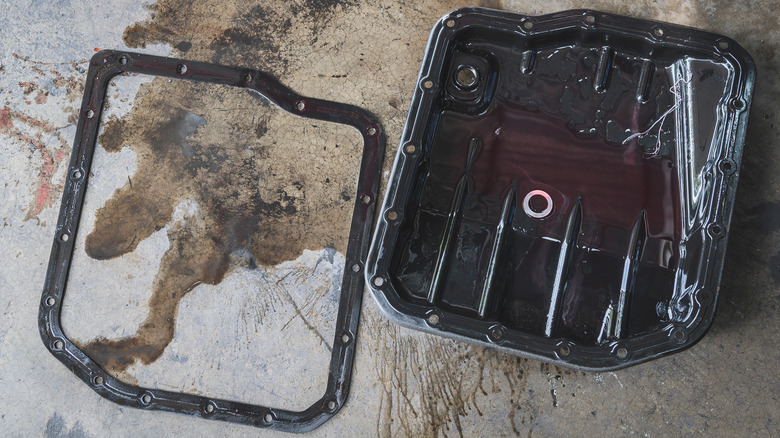Here's What Happens If You Never Change Your Transmission Fluid
There's a common misconception about the "lifetime transmission fluid" or "sealed-for-life transmission" of mainstream automakers like Audi, Toyota, BMW, Land Rover, Jaguar, Dodge, Jeep, etc. The claim is that the automatic gearboxes could last the vehicle's lifespan without an automatic transmission fluid change, but it sounds more like a marketing gimmick than the underlying truth.
Inside a modern automatic transmission is a complex array of mechanical, electrical, and hydraulic components that work day and night, no matter the weather. Holding everything together is the ATF (Automatic Transmission Fluid), the so-called lifeblood of the gearbox, and is the center of the "lifetime transmission fluid" claim.
Some manufacturers recommend flushing and replenishing the ATF every 60,000 to 100,000 miles, and you should follow this advice even if your car has a "lifetime" ATF that doesn't require draining. Why? It's because every modern consumer good — including gadgets, appliances, and cars, incidentally — was designed with some degree of planned obsolescence, which is how companies respond to ever-growing yet evolving consumer preferences.
The real deal behind lifetime ATF
A conflict exists between automakers and gearbox manufacturers regarding modern automatic transmissions with lifetime ATF. For example, particular BMW, Jeep, and Ram vehicles with the ZF six and eight-speed automatic transmission would come with claims from the manufacturer that the ATF is a "lifetime" fluid, and would not require draining or replacing — even going to the extent of designing a transmission oil pan that does not support fluid changes.
However, the ZF transmission recommends a transmission fluid and filter change at 70,000 to 80,000 miles. So, what gives? The issue is the "lifetime" claim. Does it refer to the vehicle's life? Or the extent of the warranty? Nobody knows for sure, and the automakers are tight-lipped. What's proven is professional mechanics, technicians, and engineers have noticed a rise in transmission and gearbox issues since the trend of "lifetime fluids" began nearly 20 years ago.
However, it's good practice to consult a professional if your car is out of warranty, whether it has a "lifetime ATF" or not. A reputable technician will use a scan tool to verify the health and condition of the clutch packs, the fill time, and fill pressure, among other components, before recommending a fluid change.
What happens if you never change the ATF?
What'll happen is not far from the consequences of skipping an engine oil change. It's not unusual for the ATF to collect fine metal particles over its lifespan, but having too much of it could lead to premature gearbox failure.
The ATF is a hydraulic fluid that lubricates, cools, cleans, and allows the gearbox to shift gears. Not changing the ATF is a leading cause of premature failure and accelerated wear, and you should keep this in mind if you have or have bought a used car with a lifetime ATF. This is especially true if the vehicle is out of warranty, as well as if the odometer has clocked over 70,000 miles.
Remember that replacing the oil is cheaper than repairing damaged components, and that reasoning applies to any vehicle's engine, transmission, driveline, and braking system. In the same manner that using the wrong oil could hurt your engine, pouring the wrong type of ATF could be as catastrophic as not changing the oil. The easiest way to prevent costly mistakes is to consult the owner's manual of your vehicle.


